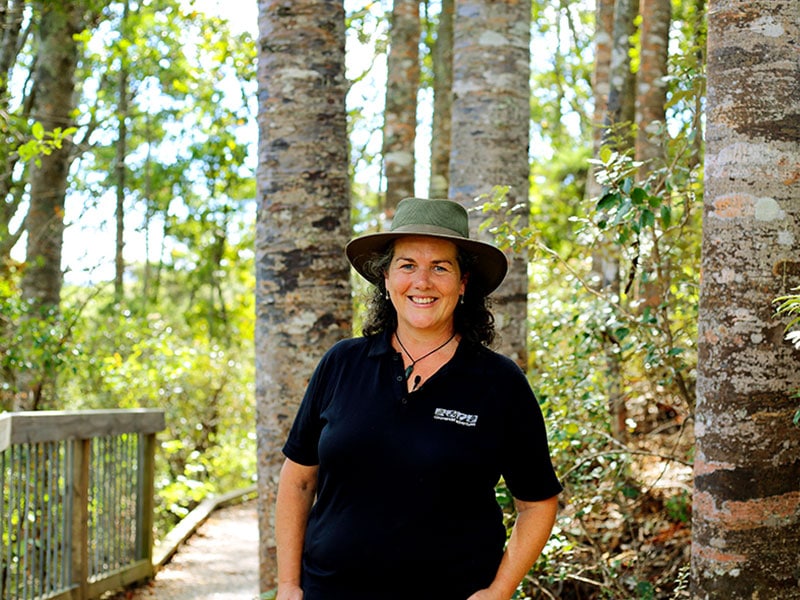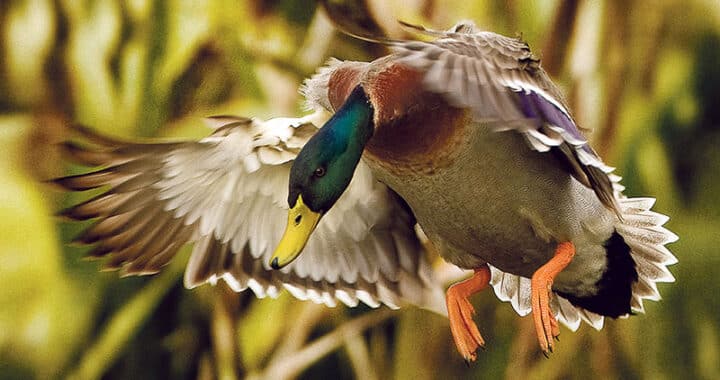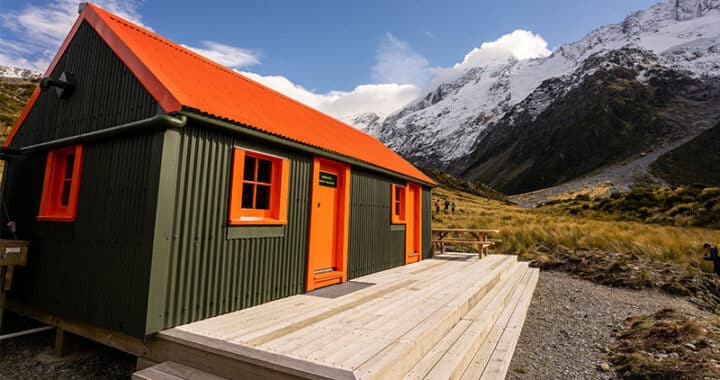Standing up for NZ native trees
6 min read
Long Bay Kauri Forest track ambassador Sarni Hart is passionate about sharing her love of kauri and native trees. Photo: Lisa Potter
Sarni Hart was once an Auckland city dweller. But a desire to give her three young children more of a ‘great Kiwi outdoors’ upbringing saw her up sticks and move across the water to Coromandel, taking a punt
that they would all adapt to small-town living.
Having initially based themselves in the tiny community of Kūaotunu, the quartet rapidly adapted to their new lifestyle, which included being delivered to kindergarten on horseback and the kind of freedom usually associated with growing up in the ’70s.
That was more than 20 years ago and Sarni, and her now adult children did more than adapt; they thrived.
With interests as diverse as free-diving, horse riding, and sport climbing, Sarni’s hopes to see her children appreciate the Kiwi outdoors and develop an adventurous spirit well and truly came to fruition.
“It was a case of being careful what you wish for,” she jokes. “They were all into pretty extreme interests in terms of exploring the land and sea around them, quite often in remote places.
“I didn’t want to curtail their adventurous spirit so I kept as close an eye on them as I could and upskilled by becoming a volunteer ambulance officer.”
And along the way, she became something of an advocate herself, for the bush, forest, coastline, and the Coromandel environment.
When passion becomes business

Sarni’s passion for her surroundings motivated her to launch a business aimed at celebrating and promoting the full Coromandel experience. Along with her husband Willie Lochore, she started Coromandel Adventures in 2011 and have continued growing and developing the business, albeit with the ups and downs that go with working in the tourism industry in these COVID-affected times.
“It came about from a few different things – wanting to showcase the extreme beauty and diversity of Coromandel and also the realisation that a lot of visitors were arriving on the ferry from Auckland and other than exploring a couple of nearby spots were unable to venture further afield because of transport restrictions.
“To start with, we wanted to close the gap in connectivity around the Coromandel, particularly for those without vehicles wanting to experience the area’s many walks, beaches and bush.”
Now with a team of experienced guides, Coromandel Adventures meets incoming ferries and offers an array of tour outings, including half- and full-day adventures as well as tailored packages. Sarni readily admits that COVID-19 created a massive seismic shock to the business and its team, although, showing true resilience, they rallied around when visitors dropped off and got involved in a community conservation project.
“We took the opportunity to give back to the areas we showcase, helping regenerate and support the environment with planting and weeding.”
Home sweet home

Especially close to Sarni’s heart is protecting the magnificent Coromandel surroundings she calls home. During a bout of ill health a few years ago, she and Willie used that slower time to collect kauri cones, growing kauri to replant along with a host of other native trees.
“It is definitely a shared interest for both of us. When I met Willie, he had a native tree nursery, which I enjoyed helping develop.
“People are often surprised to discover just how quickly trees develop from seed to seedlings – in as little as 10 days.”
The couple’s 10-acre property just out of town is home to a host of carefully nurtured native trees, as well as livestock and plenty of bush and forest around the boundaries. It’s as close to paradise as this former city dweller can imagine.
The mighty kauri guardians of the land have extra special significance for the couple who were married at Waiau Kauri Grove, with the trees standing sentinel on their special day.
“The fact we get to share the truly special surroundings of Coromandel with visitors as our business is pretty astounding. Kauri and other native trees here are special to many and we want to do our bit to ensure the next generation can continue to enjoy them too.”
As well as Coromandel Adventures having received a Qualmark Enviro Award for the work the company does with kauri dieback, Sarni is also a trustee of the Coromandel Kauri Dieback Forum and treasurer for Upper Coromandel Forest & Bird.
Of particular personal interest to Sarni (and Willie) is the future of the majestic kauri tree and help ensure the continued health of kauri in Coromandel, which includes more than 400 giants more than 1000 years old.
As one of the locations (along with Northland and Auckland) showing trees affected by kauri dieback disease, Sarni is determined to encourage good habits among locals and visitors and help educate young and old around safe ways to view bush and forest.
Saving kauri

A recent scheme that truly resonates with Sarni’s deep love for the landscape around her is a free guided tour and storytelling programme, where she and her Coromandel Adventures team host visitors (and locals) on a free walk through Long Bay Kauri forest, sharing their knowledge of the plentiful kauri, pohutukawa, puriri, and nikau.
Of key importance is encouraging people to understand and build awareness around the importance of correctly using the kauri dieback cleaning stations installed on a number of popular tracks in Coromandel, including Long Bay and Waiau Kauri Grove.
“Everything is provided so people have the opportunity to clean their footwear before entering and exiting these special places,” says Sarni.
“And part of the storytelling experience is fostering an understanding of why this is so important. It’s really rewarding seeing people completely change their mindsets and view the forest around them with fresh eyes and appreciation.”
Sarni and the Coromandel Adventures team offer three free guided forest sessions each Saturday and Sunday from Long Bay, Coromandel (just five minutes out of town).
Anyone is welcome to participate at no cost. Bookings and enquiries are available via coromandeladventures.co.nz.
Guided forest experience

he Long Bay Guided Kauri Forest experience is offered free of charge to locals or visitors interested in learning more about the Coromandel forest, particularly the magnificent kauri trees there, including a prolific kauri grove and a mesmerising 1200-year-old kauri.
Sarni and Willie from Coromandel Adventures delight in sharing their local knowledge and genuine love for the area and its trees.
Supported by the Ministry of Primary Industries, Coromandel Kauri Dieback Forum, Thames Coromandel District Council, and Waikato Regional Council, Coromandel Adventures say they are privileged to operate the track ambassador and complimentary guided walk programme at Long Bay.
The programme ends on 4 April 2021 and bookings can be made at coromandeladventures.co.nz.
Keep kauri standing

Kauri dieback may spread by movement of dirt. Staying on tracks (and off kauri root zones; they’re way bigger than you think) and cleaning footwear (along with dog paws and vehicle tyres) before and after forest visits is key to protecting kauri.
This harmful mould (or chromist) affects kauri roots and tissues that carry nutrients within the tree. There isn’t a cure but protecting kauri is simple. It is wholly about stopping the movement of dirt.
Humans are the number-one way in which the disease is spread through the movement of contaminated soil. Whether a pleasure walker, dedicated tramper, or hunter who often veers from the track or hunts with dogs, you play a vital role in helping stop the spread of kauri dieback.
So use the cleaning stations, or if you’re venturing further afield, keep a cleaning kit in your backpack or vehicle, which includes brushes to remove all traces of soil from your footwear, a supply of SteriGENE, and plastic bags for bagging any gear that can’t be cleaned onsite.
For more information, visit kauriprotection.co.nz.
Do you love social media as much as we do? Follow us on Facebook and Instagram! And stay up to date with the latest news and happenings in fishing and hunting in New Zealand.



